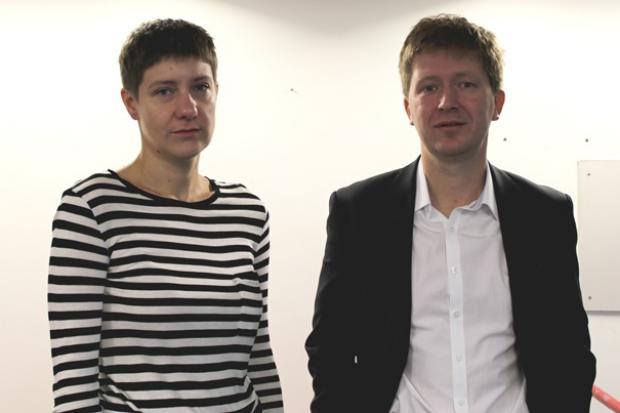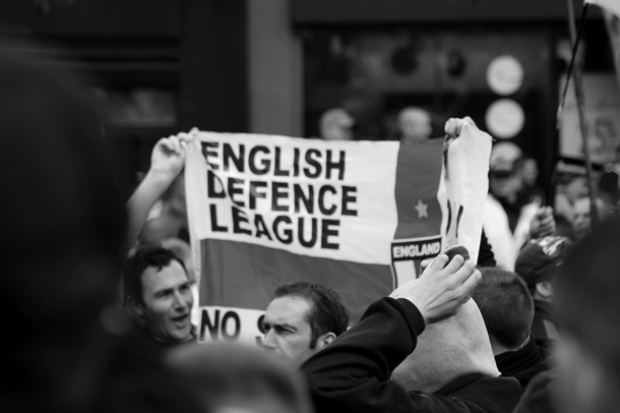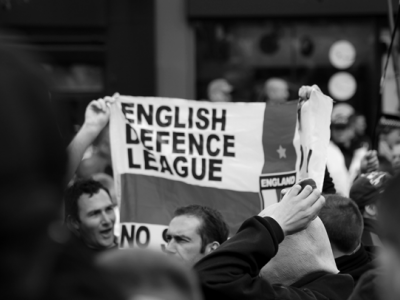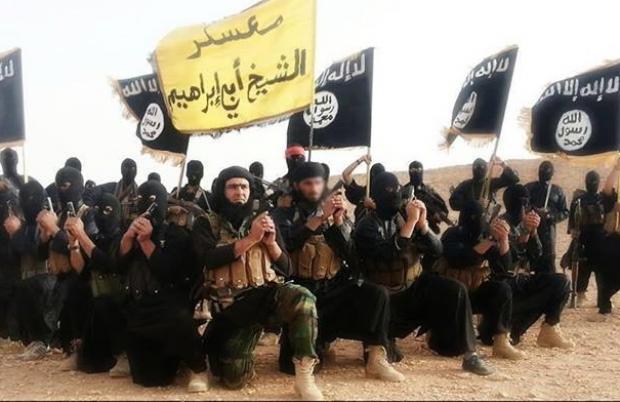We love Coca-Cola and they love death
Islamic State's absolutism has antecedents in 20th Century communism and fascism
It can be comforting to assume that the enemies of the West are simply raving ideologues who think certain thoughts and as a consequence perform certain actions. There is after all seemingly a long tradition of it. Human perfection may be impossible, but the movements which strive for it are probably ineradicable. Death, as Saul Bellow put it, is ‘the dark backing that a mirror needs if we are to see anything’. Yet a sizeable number of human beings are always ready to believe that by smashing the mirror they can be rid of the darkness.
This sort of total solution promises to assemble the pieces of the jigsaw at one stroke. It is therefore perennially attractive to the type of intelligence that is always looking for ever-more complex ways to stop thinking. This is immediately discernible from the testimonies of ex-believers of one sort or another. The discovery of a complete ideology provides “an answer to every question”, as Arthur Koestler put it when describing the “light which poured in all directions” when he embraced communism.
For those like Koestler, the intoxicating philosophy of communism proved "scientifically" that "all things obey money", as Solomon says in Ecclesiastes. It retained the attachment to vicarious glory that characterised fascism, but it transferred it from the individual onto class. It replaced love for individuals with love for the human race.
The revolutionary process represented “justice at the service of future justice”, as Che Guevara put it. Murder was just if it saved the lives of future unborn children. Thus the people of Cuba would, according to Guevara, feel “completely happy and fulfilled” if they should “disappear from the face of the earth” because an atomic war had been unleashed in their names.
Fascism on the other hand was and remains the small man writ large. As such it appeals to those who seek glory-by-association with both the nation and the Übermensch. The mediocrity of the fascist is temperamentally incompatible with the sort of liberal society that, as the German nationalist Arthur Moeller van den Bruck put it, gives “everyone the freedom to be a mediocre man”.
This sounds paradoxical until you grasp that fascism is largely about the projection of greatness onto someone (the great leader) or something else (the nation). Under liberal capitalism, there is very little vicarious glory to be found in watching someone choose what they want to buy from the 10 different varieties of soda in the aisles of a supermarket. So instead the fascist demands that life is given meaning by the rattle of spurs, the soaring grandeur of battle and the elimination of individuals whose existence threatens the fragile illusions of “ingroup” superiority.
You might describe Salafi-Jihadism as a hybrid of fascism and communism with Islamic characteristics
The point of this sojourn is to note that violent Jihadism, the subject of Shiraz Maher’s excellent new book, Salafi-Jihadism: The History of an Idea, combines elements of both aforementioned ideologies. You might even at a stretch describe Salafi-Jihadism as a hybrid of fascism and communism with Islamic characteristics.There is of course more to it than that – the doctrinal intricacies of Salafi-Jihadism have their own logic, for one thing – but there are unmistakable similarities with respect to the violent subordination of the present to the future and absolute opposition to liberal mediocrity.
Salafi-Jihadism is a redemptive philosophy which seeks ‘progress through regression’, as Maher, a senior research fellow at King’s College London, writes. And he should know what he is talking about: before as conducting this extraordinarily comprehensive study, Maher was a promising young proselytiser with Hizb ut-Tahrir, a totalitarian Sunni organisation, until he left in disgust after the 7/7 London Underground bombings of 2005.
The five central tenets of Salafi-Jihadism (endlessly poured over by hair-splitting Islamic Dialecticians) are: Jihad, Takfir, Al-Wala’ wa'l-bara, Tawhid, and Hakimiyya. Together these form a doctrine of millenarian change concerned mainly with protection of the religion through battle (Jihad, al-wala’ wa'l-bara and takfir), and promotion of the ideology across the world (tawhid and hakimiyya). To quote Maher:
“The doctrine of al-wala’ wa'l-bara’ establishes lines of loyalty and disavowal; takfir delineates Islam against everything else and protects it against insidious corruption from within; tawhid and hakimiyya explain what legitimate authority should look like and who it should serve; and jihad prescribes the method for this particular revolution.”
This is a book that will upset everyone, which is precisely why it is an invaluable read. In order to write anything that is worth reading nowadays you have to be willing to be disowned by your own “side”. Everything else is propaganda that starts with a “line” before gathering evidence to fit the doctrine. Thus “analysis” of Islamist terrorism invariably adopts one of two arguments: it is either Islam or the West which carries the can for the upsurge in Jihadist violence.
Liberals self-flagellate about everything being “our fault”,whereas conservatives peruse the Quran furtively looking for proof that Islam is uniquely malevolent. Both sides invert the main thrust of the other’s argument. Those who would blame the West typically absolve religion, while those who hold Islam responsible dump all the problems of the world on its head.
The complete breakdown of Iraqi society created new realities on the ground which Islamic doctrine was hastily moulded to fit
Maher acknowledges that the ideas which guide Islamic State are “well established in radical Sunni thought”. However in a blow to those who seek to let the West off the hook, he also adheres to Leon Trotsky’s admonition that “war is the locomotion of history”. “All [Salafi-Jihadism] major ideological shifts have come in response to war,” Maher adds. The total idea is like a parasitic plant that derives its sustenance from the follies of liberal democracy as well as its existence.
This includes the West’s ill-conceived 2003 adventure in Iraq, when the complete breakdown of Iraqi society created new realities on the ground which Islamic doctrine was hastily moulded to fit. It rapidly became a scriptural imperative for Muslims to slaughter fellow Muslims. “The rafidah (Shia) near us are more dangerous than the Americans,” pronounced Abu Musab al-Zarqawi, the founder of Islamic State's Forerunner al-Qaeda in Iraq, as his minions detonated bombs outside Shi’a mosques.
There is, then, a dialectical relationship between the type of modernity that various groups (both domestic and occidental) have attempted to forcibly impose on the Middle East, and the murderous response by religious reactionaries.This is true of Western hubris that believed democracy could be dropped from the hatch of a B-52 bomber, but also of secularist and Arab nationalist attempts to give history a violent shove in the manner of a Lenin or an Ataturk.
Just as fascism was incubated by the enlightenment, Islamism was the revolutionary idea coiled within the secularist revolution, as Ian Buruma and Avishai Margalit have written. The political initiatives of Islamists in places like Iraq, Syria, Egypt, Algeria and Tunisia were crushed like rotten fruit in the second half of the 20th century. A more strident ideological tendency was incubated in the prisons and torture chambers of the Saddam Husseins, Ben Bellas, Gamal Abdel Nassers and Hafez al-Assads of the world. And as Albert Camus wrote in The Rebel, what “intelligence in chains loses in lucidity it gains in intensity”.
The ideological ramparts which separate the centre from the extremes within Islam are not as compartmentalised as polite society wishes to pretend
As a consequence of the brutal repression of its more moderate wings, Islamist doctrine took on ever-more extreme manifestations in tandem with the deteriorating political reality. The process is an ongoing one. Nowhere is this more in evidence today than in Syria, where the barrel bombs of Bashar al-Assad galvanise the ultra-violence of the Islamic State by the systematic murder of more moderate forces.
Whereas state socialism and Ba’athism had been modernising creeds – they were, for all the murder and economic failure, attempts to propel their countries into the machine civilisation of the future while eschewing full Westernisation – Salafi-Jihadism seeks to drag history back to an Islamic golden age.Utopia is a return to the time when the first three generations of Muslims dutifully followed the Prophet’s teachings free from spiritual pollution. In common with the typically race-obsessed fascist, all enlightenment doctrines are an affront to the Salafi-Jihadist because liberté, égalité and fraternité invariably contradict the Manichean notions of “in” and “out” groups on which Islamism – and to some extent Islam itself – depend.
Under liberal capitalism the name of infidel is given to “none but bankrupts”, as Voltaire put it; whereas for the fascist and the Islamist the “organic” community and the Umma are premised, respectively, on subordinating the non-Aryan and the impious.
Islam’s malleable labels of takfir and kuffar (a derogatory term for disbelievers) are sprayed around freely by Salafi-Jihadists just as accusations of fascism’ and craven reformism were hung around the necks of Stalin’s victims almost a century ago. Once you begin to separate human beings into sheep and goats, before long someone is usually willing to take it further by physically liquidating the un-pure, the Kulak or the Infidel.
As with other religions, the ideological ramparts which separate the centre from the extremes within Islam are not as compartmentalised as polite society wishes to pretend.
The fact that an exclusionary thread runs right the way from some “moderate” interpretations of Islam to Salafi-Jihadism will give a jolt to most readers of this book.Indeed, the concept of takfir is regularly deployed by various moderate critics of ISIS to draw a dividing line between the righteous in group of the pious and the heretics and unbelievers. Non-Muslims are still not quite equal.
The rebellion against the modern is discernible in the Eurasionist doctrines of Vladimir Putin’s Russia as well as on the far-right in Britain
In mainstream Islam, jihad is legitimate when its aim is to protect both Islam and Muslims. If the Islamic community is under attack, jihad may be carried out. Salafi-Jihadists take things further by arguing that private citizens are responsible for the crimes of their governments. The West is the root of all suffering in the Muslim world and therefore its very existence becomes another attempt to subjugate the Muslim world.
“Alternative political systems consequently promote shirk (the sin of idolatry or polytheism) by giving prominence to the role of human legislators and individual sovereignty,” Maher writes. The West, by its very existence, pollutes the Islamic Umma (the global Muslim community).
But to damn Islam alone would be a mistake. The same rejection of the “impure”, “decadent” and “soulless” Occident in Salafi-Jihadism can be found in almost every culture that has some interaction with the West. The rebellion against the modern is discernible in the Eurasionist doctrines of Vladimir Putin’s Russia as well as on the far-right in Britain.
It is contained in the anti-Jewish conspiracy theories of continental nationalism and even in the dogma of some ultra-orthodox Jews, who refuse to recognise the state of Israel. It can even be found in well-known English literature, such as in the books of DH Lawrence when he rails endlessly against the corruption of machine civilisation. “It’s all a steady sort of Bolshevism just killing off the human thing, and worshipping the mechanical thing. Money, money, money!”
Indeed, the entire purpose of much of Lawrence’s work is to argue that sensuality is superior to science, the machine and “Bolshevism” (the latter being little more than code for the enlightenment). The enlightenment has provoked reaction of varying degrees in every locality where its “rootless” set of ideas has put down roots. Similarly, the whole mental process can just as easily be turned on its head, with the mystical foreign “savage” viewed as a highly emotional creature who must have rationality foisted upon him in the fashion of a hammer smashing a nut.
There is no point in the atheist asking who the true believer is
Most of those who read Maher’s book will probably have one specific question in mind: Is the Islamic State really Islamic? Or is it, as the BBC would have it, merely a so-called Islamic State?
Ever since the collapse of state socialism in 1989 a debate has raged on the left as to whether or not the crimes of the Russian experiment represented “real” socialism. Yet such speculations are utterly fruitless. There can be no pure interpretation of a text because as soon as the words are read they interact with human nature and the social conditions of a particular time and place. Every ideology is in a dialectical relationship with the existing social order.
The same principle must surely apply to Islam. For the person who does not subscribe to divine truth, the question of whether someone or something is truly Islamic can only ever result in a futile and circular argument. It necessarily puts the sceptic in the contradictory position of being asked to believe that there can be an “authentic” version of a divine “truth” which he does not himself accept.
There is no point in the atheist asking who the true believer is because, to paraphrase the Polish historian Leszek Kolakowski in reference to Marxism, such questions assume that the canonical writings are the authentic source of truth. While it is undoubtedly of personal importance to the well-meaning believer to declare that the next Salafi terrorist “ain’t no Muslim, bruv”, it is probably irrelevant to the history of ideas.







